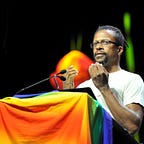Why Can’t Prayer Be Our Prayer?
Over the years I’ve regularly seen the following words as part of Unitarian Universalist covenants and worship openings:
“Love is our doctrine, the quest for truth is our sacrament, and service is our prayer.”
Rev. Peter Morales published an article with UU World in 2010 that is titled “Service Is Our Prayer”[1] and he ends the piece by saying simply, “May service always be our prayer.”[2] I have often heard congregants across the country refer to social justice as their “religion.” But without trying to unpack that particular theological steamer trunk in a short blog post, I find myself asking why can’t prayer be our prayer? Why do Unitarian Universalists have to apply some other meaning or framework to prayer for it to have value in our theology? Are we really that disinterested? Are we really that damaged? Are we really that uncurious? My concern is that we don’t do enough to teach people (in particular ministers) about prayer and we don’t provide enlightened alternatives to people who are actually starving for the unique kind of sustenance that something as simple as prayer might give them.
Some of what I’m offering here is certainly based on a degree of generalization. Many Unitarian Universalists do pray and they do so in a variety of ways. But prayer is not a broadly promoted or consistently applied tool in UU spiritual experiences. The great irony for me in the statement “service is our prayer” is that so very often, particularly in the interfaith organizing that so many of our congregations are attracted to as their form of service, the other traditions we work alongside begin and end every meeting, gathering and action with some kind of literal prayer. For them, service needs prayer.
I have regularly been asked to offer prayer in these settings because the assumption is that as a faith leader, I have easy access to the facility to invoke what is traditionally thought of as prayer. I’m lucky, my first professor in seminary, Rev. Jim Mitulski gave me a direct command when I first met him, “Pray aloud every day.” Having been raised in Christian traditions, prayer was never foreign to me, but making it an intentional, daily, verbal practice changed things for me. It gave me fluency of language and imagery and purpose with prayer. But even more than that, it helped me understand that prayer does not have to be as much about the words (as Rev. Morales references[3]) as it is about the practice itself and the motivation behind that practice.
I learned that prayer can be one way to focus intentionally and exclusively on what is most important to us in any given moment. Prayer in this way is very intentionally not the “doing” but the “being.” Often, when I speak of ‘focus’ in UU circles however, people drift into vaguely informed conversation about Buddhism and meditation. But this does those practices and traditions a disservice and I have found prayer needs to be something very different. For Unitarian Universalists in particular, prayer presents a tremendous opportunity. Through prayer, one is able to pause the march of time in the mind and sink into all the many feelings, hopes, fears, anxieties and joys one may have about something and this is not the same as meditation. Prayer is not still; it is not clearing. I find that prayer does the opposite, it gathers and brings even greater presence, whether that is to conflict or joy. Prayer works and wrestles; it is not necessarily calm and it is often active and alive even if it is quiet. While prayer can ease a sense of turmoil it has the capability to exhilarate just as well.
Another key difference for me with the act of prayer is the intentional humbling to the human experience, a certain kind of surrender that happens in the act of prayer. It is like an inner leveling of all the forces that invites both acceptance and strength, independence and interconnectedness. Sinking into this unique place and calling up words to frame and crystalize it in my own private experience or in the experience of others listening to me publicly feels like a truly holy exchange. This is one of the most sacred tasks I have the privilege to perform anywhere, in any faith setting.
So I ask again, why can’t prayer be our prayer? We are just as deserving of this unique spiritual blessing as anyone. What is the language that Unitarian Universalists, religious professionals and lay people alike can embrace that doesn’t deny us the gift of prayer? As a child of the Civil Rights Movement, I know that service will always be more powerful with prayer not in place of it.
-ALD
[1] Peter Morales, “Service Is Our Prayer,” UU World Magazine, September 27, 2010, https://www.uuworld.org/articles/service-is-our-prayer.
[2] Peter Morales.
[3] Peter Morales.
Originally published at https://spirituwellness.com on May 21, 2021.
